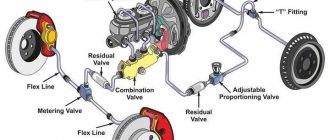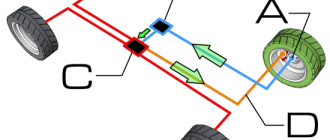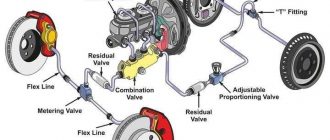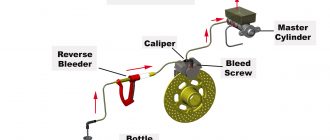## Bosch ABS Brake System in Cars: An In-Depth Guide
### Introduction
The Bosch Anti-lock Braking System (ABS) is a critical safety feature that has revolutionized the automotive industry. It prevents wheel lockup during braking, allowing drivers to maintain control of their vehicles even in emergency situations. This comprehensive guide will delve into the inner workings of the Bosch ABS system, exploring its components, operation, and benefits.
### Components of the Bosch ABS System
The Bosch ABS system consists of several key components:
— **Wheel Speed Sensors**: These sensors monitor the speed of each wheel and send this information to the ABS control module.
— **ABS Control Module**: The brain of the ABS system, this module analyzes wheel speed data and activates the ABS functionality as needed.
— **Hydraulic Modulator**: This device modulates the hydraulic brake pressure to each wheel, preventing lockup.
— **Hydraulic Pump**: Provides pressurized brake fluid to the hydraulic modulator.
— **Accumulator**: A reservoir that stores brake fluid under pressure, allowing the ABS system to function even with a loss of engine power.
### Operation of the ABS System
When the driver applies the brakes, the wheel speed sensors transmit the rotational speed of each wheel to the ABS control module. The control module compares these speeds and detects when a wheel is about to lock up. If a lockup is imminent, the control module activates the hydraulic modulator.
The hydraulic modulator uses solenoid valves to adjust the hydraulic brake pressure to the affected wheel. By reducing the pressure, the modulator prevents the wheel from completely locking up and allows it to continue rotating. This process is repeated rapidly, allowing the vehicle to decelerate while maintaining steering control.
### Benefits of the Bosch ABS System
The Bosch ABS system offers numerous benefits, including:
— **Enhanced Safety**: Prevents wheel lockup, reducing the risk of skidding and loss of control.
— **Improved Braking Distance**: Allows drivers to apply maximum braking force without triggering wheel lockup, resulting in shorter stopping distances.
— **Increased Stability**: Maintains steering control during braking, allowing drivers to maneuver and avoid obstacles.
— **Reduced Tire Wear**: By preventing wheel lockup, the ABS system reduces tire wear and extends their lifespan.
— **Compliance with Safety Standards**: ABS systems are now mandatory in many countries due to their significant safety benefits.
### Maintenance of the Bosch ABS System
Like any other automotive system, the Bosch ABS system requires regular maintenance to ensure proper functioning:
— **Visual Inspection**: Regularly inspect the ABS components for any visible damage or leaks.
— **Fluid Level Check**: Check the brake fluid level and top up as necessary.
— **Sensor Cleaning**: Clean the wheel speed sensors to prevent dirt or debris from interfering with their operation.
— **Diagnostic Check**: Periodically perform a diagnostic check using a scan tool to identify any potential issues.
— **Professional Service**: If any issues are detected during maintenance, seek professional assistance for repair or replacement.
### Troubleshooting Common ABS Issues
While the Bosch ABS system is generally reliable, certain issues may occasionally arise:
— **ABS Warning Light**: If the ABS warning light illuminates on the dashboard, it indicates a potential malfunction.
— **Reduced Braking Performance**: If the ABS system is not functioning properly, braking distance and stability may be compromised.
— **Wheel Vibration**: A pulsating sensation in the brake pedal or steering wheel during braking can indicate an ABS problem.
— **Sensor Malfunction**: Faulty wheel speed sensors can prevent the ABS system from operating correctly.
— **Hydraulic Modulator Failure**: A malfunctioning hydraulic modulator can lead to ABS failure and reduced braking effectiveness.
If any of these issues occur, it is crucial to seek professional diagnosis and repair to restore the ABS system’s functionality and ensure vehicle safety.
### Conclusion
The Bosch ABS brake system is a vital safety feature that has significantly reduced the number of road accidents and fatalities. By preventing wheel lockup and maintaining steering control, the ABS system empowers drivers to handle emergency braking situations with confidence. Understanding the components, operation, benefits, and maintenance requirements of the Bosch ABS system is essential for ensuring the optimal performance and safety of your vehicle.






